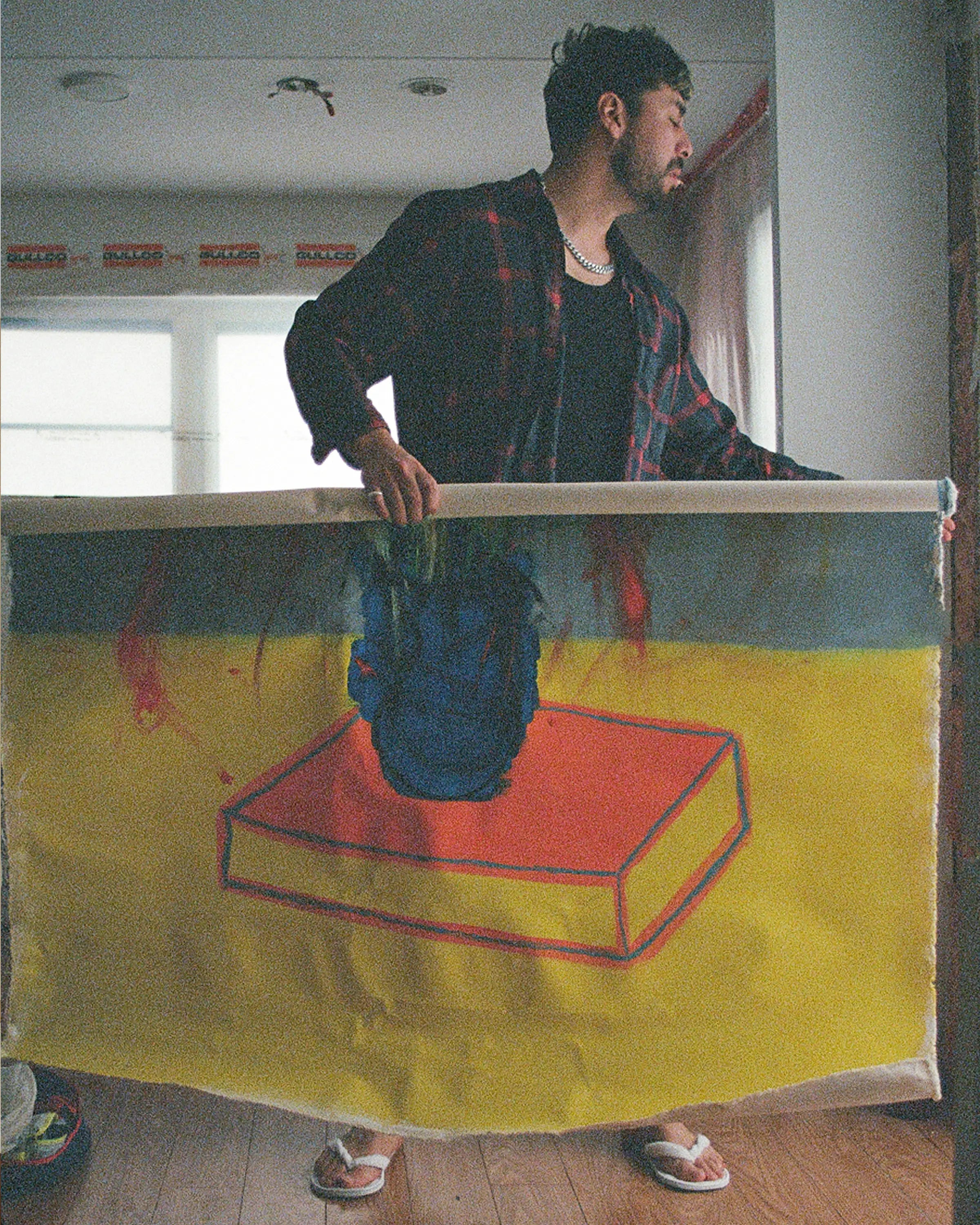
Paul Scott Coca
Today we're launching a collaboration with P.S. Coca, a Toronto-based artist whose practice moves fluidly between visual, material, and ritual work.
Born in Canada, raised in South Africa, OCAD graduate. Former student union rep and foodshare coordinator. His path: raw natural wine, spinning records, reupholstered furniture, community restoration. Non-linear. Intentionally slow. Process over product.
This capsule marks the archival release of his early 1-of-1 fashion works — sewn, cut, and constructed in his student years, now reframed as testament: evolving through what we make, wear, mend, and remake again.
We meet Coca an hour north of the city, inside his current project: a gutted mobile home, now being revived into a compact live-work retreat. Reimagined with an edible garden, sauna, and integrative indoor-outdoor flow. Part shelter, part slow-living prototype — the space reflects a philosophy of mobility, slowness, and resourcefulness.
What are you currently learning (or unlearning) through the act of building your own space from the inside out?
Currently I am learning how to really listen. To be silent, to be alone. There is much to take inspiration on this beautiful planet but to take inspiration from listening to your inner child, inner peace and your heart is far more powerful than anything you can tangibly see with your own eyes and feel with your hands.
Every single day is a chance to Unlearn. It's hard to recognize the bad habits when it's all we know and all we were taught growing up. Choose to unlearn, it may teach you something.
In a world built on speed and convenience, you've chosen slow, often laborious ways of living and creating. What fuels that choice? And what do you lose by choosing process over immediacy?
So the idea of slow living is actually very relevant to most artists. Sometimes mistaken for procrastination, but for most it's part of the larger picture. Sometimes when you rush projects or concepts things don’t turn out the way you expected or maybe you never end up finishing what you started because the idea was too big for you to accomplish. Taking things day by day, slow living is as much of a concept as it is a practice. You know yourself the best, staying away from the mundane 9-5 job or going to clubs every weekend in Toronto has really helped me to focus on what my priorities are, has helped me escape a life of negligence to myself and my work. Immediacy really comes when the process is ongoing and necessary like building a garden, when you start you need to finish in order to reap the fruits of your ongoing labour. I find some work that I do is created from start to finish within a few days.
This capsule was born in a basement on a far post graduate studies. After studies, the culture around you, or your own internal world? What were you experimenting with in terms of cut, structure, or material at the time?
Influence for the capsule was to prove to myself that the passion I had for wearable comfortable designs was possible. The colour pallet for the line is very primary, very bright and colourful. I think the Idea of play and expression had its hands in the mix. There are countless of designers that have influenced me over the years, McQueen, Raf simons, Heron Preston, Mugler, Dries Van Notten, Random Identities, Chet Lo, Maison Margiela, Ottolinger, Saul Nash, Vivienne Westwood and old Valentino. Other labels like ADER ERROR also have a huge influence on future perspectives outside of just fashion.
You were active in the student union and ran foodshare initiatives. How did that shape your sense of creativity as something systemic, rather than just self-expressive?
This decision to start my own collection came at a very low and vulnerable time in my life. In 2018 after leaving Toronto for a year I created sourced cut and sewed my designs in the cold basement at my parents farm house. There was no deadline and the clothes were for no one to see or wear at the time. When you look at what the industry of clothing has done to our planet you really start to be intentional about what you wear, how ethical it is or how it was made. I never wanted to make clothing ever again. The idea that I was contributing to the pile of unworn clothing was slowly eating at my morals. That concluded my decision and promise to never get into producing clothing on a large scale. If I ever did again what would that look like? Maybe natural hemp cotton, recycled materials, more cotton? Merino or Alpaca Wool? Who knows.
What are you working on now?
After the prototypes of the collection were finished, I quickly got into antique and MCM furniture restoration projects, so much that it became a part time job along with taking in clients for seamstress services from my home in Kensington Market. The pandemic came and I was stuck with this workshop full of furniture and paintings. In 2020 I started to produce natural wine, a long love letter to myself and to my friends that enjoyed it along the way. The idea of alchemy and expressing yourself through agriculture and wine making was fascinating and I still continue to make wine in smaller batches to date every year. Clothing? Painting? Furniture? Wine? How does all of this all co-exist? I haven't got a clue.